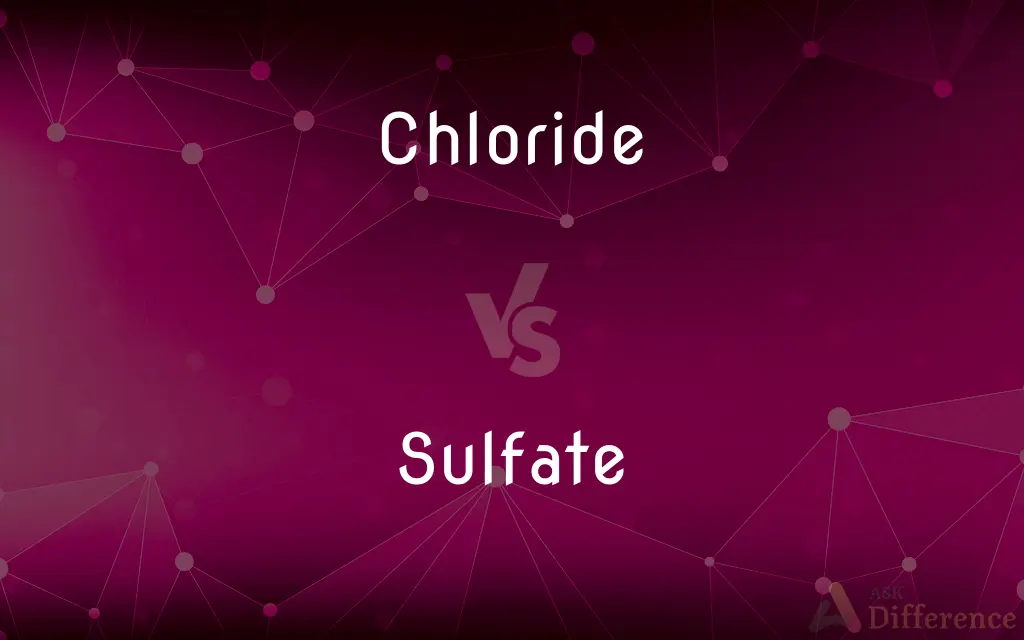Chloride vs. Sulfate — What's the Difference?
Edited by Tayyaba Rehman — By Urooj Arif — Updated on April 2, 2024
Chloride ions are essential for fluid balance in living organisms, while sulfate ions are crucial for protein synthesis and various cellular processes.

Difference Between Chloride and Sulfate
Table of Contents
ADVERTISEMENT
Key Differences
Chloride is a negatively charged ion (anion) formed when chlorine gains an electron. It plays a critical role in maintaining fluid balance and transmitting nerve impulses in living organisms. On the other hand, sulfate is an anion formed from sulfur and oxygen (SO4^2-). It is involved in detoxification processes and the synthesis of proteins and enzymes in the body.
While chloride is predominantly found in seawater, making it abundant in marine environments, sulfate ions are present in both freshwater and seawater, as well as in the atmosphere. This difference illustrates their varied sources and roles in environmental chemistry.
In industrial applications, chloride ions are used in the production of chlorine gas, PVC, and disinfectants due to their strong reactivity. Sulfate ions, however, are utilized in the manufacture of fertilizers, chemicals, and as a drying agent in the laboratory because of their ability to attract water molecules.
The health implications of chloride and sulfate also differ. High levels of chloride in drinking water can contribute to a salty taste and corrosion of pipes, whereas high sulfate levels can cause a laxative effect and are associated with the formation of acid rain.
Despite these differences, both chloride and sulfate are vital for the environment and biological processes. They participate in the water cycle, influence soil chemistry, and affect plant and animal life in various ways.
ADVERTISEMENT
Comparison Chart
Chemical Composition
Cl-
SO4^2-
Role in Biological Systems
Fluid balance, nerve function
Protein synthesis, detoxification
Environmental Presence
Predominantly in seawater
In freshwater, seawater, and atmosphere
Industrial Use
Chlorine gas, PVC, disinfectants
Fertilizers, chemicals, drying agent
Health Implications
Salty taste, pipe corrosion
Laxative effect, acid rain formation
Compare with Definitions
Chloride
Can cause corrosion in high concentrations.
High chloride levels can corrode metal pipes.
Sulfate
Can cause a laxative effect in high concentrations.
Drinking water with high sulfate content may have a laxative effect.
Chloride
A negatively charged ion of chlorine.
Chloride ions in seawater are crucial for marine life.
Sulfate
A compound containing sulfur and four oxygen atoms.
Sulfate ions are found in both natural and polluted waters.
Chloride
Found in table salt as sodium chloride.
Sodium chloride is essential for human health.
Sulfate
Essential for protein synthesis in organisms.
Sulfate participates in the synthesis of sulfur-containing amino acids.
Chloride
Vital for fluid balance and nerve transmission.
Chloride ions help maintain the body's electrolyte balance.
Sulfate
Used in industrial fertilizers.
Sulfate is a component of many fertilizers to supply sulfur to plants.
Chloride
Used in the production of disinfectants.
Chloride is a key component in many disinfectants.
Sulfate
Contributes to the formation of acid rain.
Sulfate aerosols in the atmosphere can lead to acid rain.
Chloride
The chloride ion is the anion (negatively charged ion) Cl−. It is formed when the element chlorine (a halogen) gains an electron or when a compound such as hydrogen chloride is dissolved in water or other polar solvents.
Sulfate
The sulfate or sulphate ion is a polyatomic anion with the empirical formula SO2−4. Salts, acid derivatives, and peroxides of sulfate are widely used in industry.
Chloride
Univalent anionic chlorine, or a compound of chlorine, especially a binary compound of chlorine with a more electropositive element.
Sulfate
The divalent group SO4 or a compound containing this group.
Chloride
(chemistry) any salt of hydrochloric acid, such as sodium chloride, or any binary compound of chlorine and another element or radical
Sulfate
To treat or react with sulfuric acid or a sulfate.
Chloride
A binary compound of chlorine with another element or radical; as, chloride of sodium (common salt).
Sulfate
(Electricity) To cause lead sulfate to accumulate on (the plates of a lead-acid storage battery).
Chloride
Any compound containing a chlorine atom
Sulfate
To become sulfated.
Chloride
Any salt of hydrochloric acid (containing the chloride ion)
Sulfate
(organic chemistry) Any ester of sulfuric acid.
Sulfate
(inorganic chemistry) Any salt of sulfuric acid.
Sulfate
To treat something with sulfuric acid, a sulfate, or with sulfur dioxide.
Sulfate
(of a lead-acid battery) To accumulate a deposit of lead sulfate.
Sulfate
A salt or ester of sulphuric acid
Common Curiosities
How do chloride and sulfate impact human health?
Excessive chloride can lead to a salty taste and corrosion, whereas high sulfate levels can have a laxative effect and contribute to acid rain.
Can high levels of chloride or sulfate be harmful?
Yes, high levels of either ion can have negative health implications and environmental impacts, such as corrosion, laxative effects, and acid rain formation.
Where are chloride and sulfate ions commonly found?
Chloride ions are abundant in seawater, while sulfate ions are found in freshwater, seawater, and the atmosphere.
What roles do chloride and sulfate play in biological systems?
Chloride is vital for fluid balance and nerve function, while sulfate is essential for protein synthesis and detoxification.
Are chloride and sulfate used in industrial applications?
Yes, chloride is used in producing chlorine gas and disinfectants, while sulfate is utilized in manufacturing fertilizers and chemicals.
What is the primary difference between chloride and sulfate?
Chloride is a single ion of chlorine, essential for fluid balance, while sulfate consists of sulfur and oxygen, important for protein synthesis.
What is the significance of chloride in the water supply?
Chloride levels in water are monitored because they can affect taste, corrosion rates, and overall water quality.
Why is sulfate important for plants?
Sulfate is a vital nutrient for plants, necessary for the synthesis of proteins and certain amino acids.
How does the presence of sulfate in the atmosphere affect the environment?
Sulfate aerosols in the atmosphere can contribute to cloud formation and acid rain, impacting climate and environmental health.
How do chloride and sulfate contribute to environmental chemistry?
Both ions are integral to the water cycle, influence soil and water chemistry, and affect plant and animal life differently.
Share Your Discovery

Previous Comparison
Thing vs. Object
Next Comparison
Posit vs. PostulateAuthor Spotlight
Written by
Urooj ArifUrooj is a skilled content writer at Ask Difference, known for her exceptional ability to simplify complex topics into engaging and informative content. With a passion for research and a flair for clear, concise writing, she consistently delivers articles that resonate with our diverse audience.
Edited by
Tayyaba RehmanTayyaba Rehman is a distinguished writer, currently serving as a primary contributor to askdifference.com. As a researcher in semantics and etymology, Tayyaba's passion for the complexity of languages and their distinctions has found a perfect home on the platform. Tayyaba delves into the intricacies of language, distinguishing between commonly confused words and phrases, thereby providing clarity for readers worldwide.














































